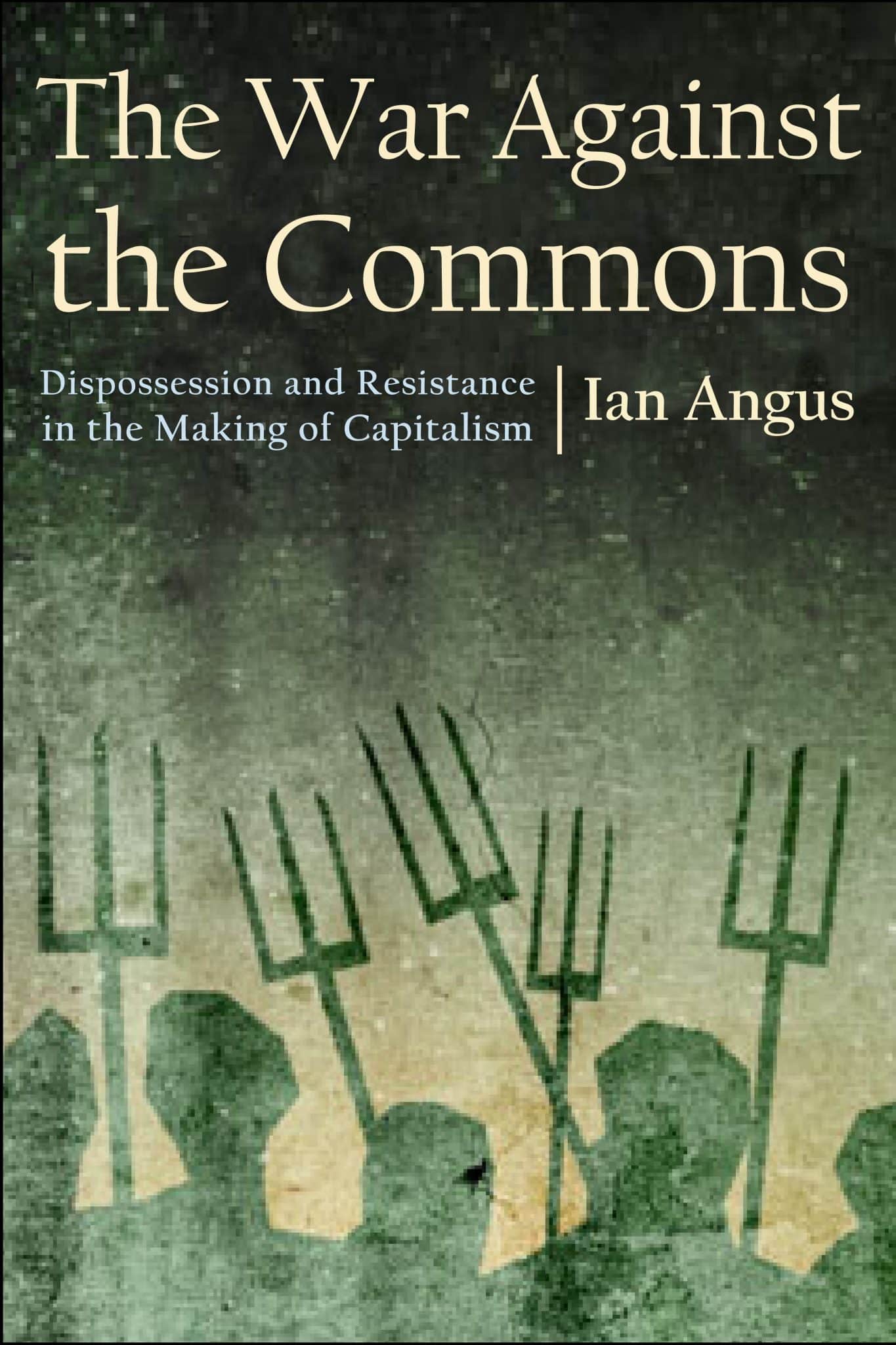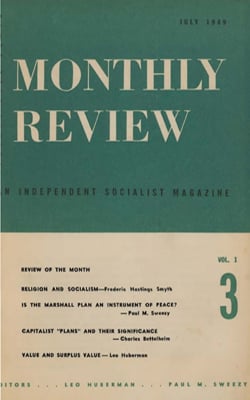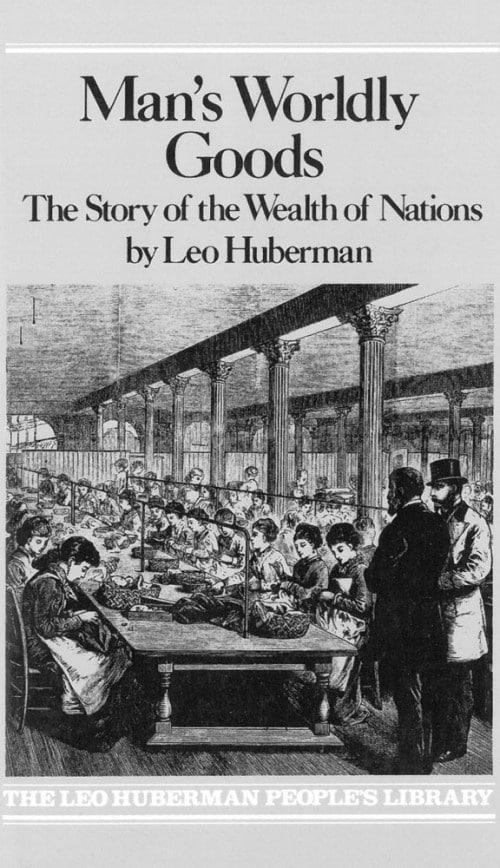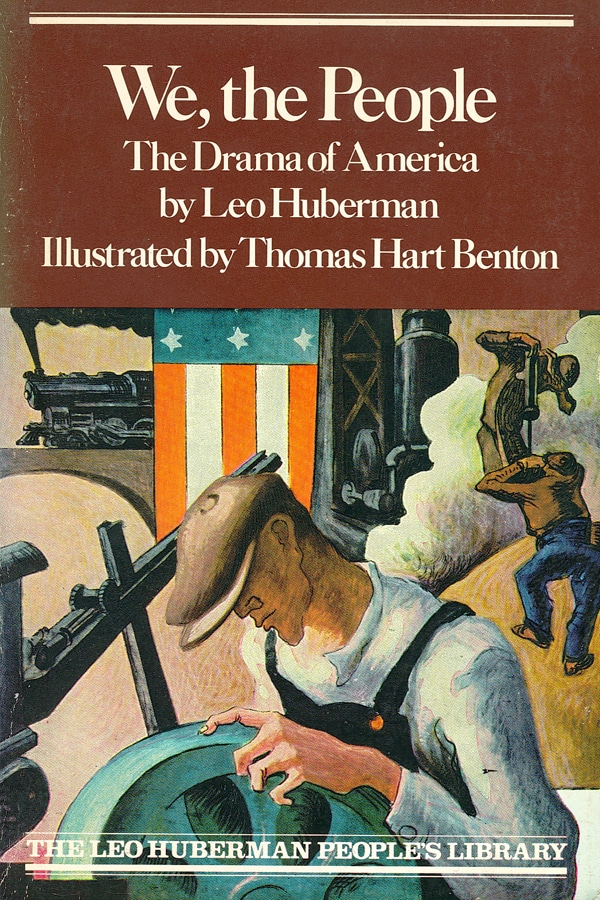New! The War Against the Commons: Dispossession and Resistance in the Making of Capitalism
$26.00 – $89.00
A unique historical account of poor peoples’ self-defence strategies in the face of the plunder of their lands and labor
For five centuries, the development of capitalism has been inextricably connected to the expropriation of working people from the land they depended on for subsistence. Through ruling class assaults known as enclosures or clearances, shared common land became privately-owned capital, and peasant farmers became propertyless laborers who could only survive by working for the owners of land or capital.
As Ian Angus documents in The War Against the Commons, mass opposition to dispossession has never ceased. His dramatic account provides new insights into an opposition that ranged from stubborn non-compliance to open rebellion, including eyewitness accounts of campaigns in which thousands of protestors tore down fences and restored common access to pastures and forests. Such movements, he shows, led to the Diggers’ call for a new society based on shared ownership and use of the land, an appeal that was more sophisticated and radical than anything else written before the 1800s.
Contrary to many accounts that treat the reorganization of agriculture as a purely domestic matter, Angus shows that there were close connections between the enclosures in Britain and imperial expansion. The consolidation of some of the largest estates in England and Scotland was directly financed by the forced labor of African slaves and the colonial plunder of India.
This unique historical account of ruling class robbery and poor peoples’ resistance offers answers to key questions about the history of capitalism. Was enclosure a “necessary evil” that enabled economic growth? What role did deliberate promotion of hunger play in the creation of the working class? How did Marx and Engels view the separation of workers from the land, and how does resistance to enclosure continue in the 21st century?
What people are saying about The War against the Commons
A tremendous and vital book. In writing that combines scholarship, clarity and passion, Ian Angus tells a story that needs to be known by every environmental activist, every anti-capitalist and every ecosocialist: how capitalism, throughout its blood-soaked history, has been built on the theft of the commons from the people.—JOHN MOLYNEUX, late Coordinator of the Global Ecosocialist Network and editor of Irish Marxist Review
An impressive account of the real tragedy of the commons. Ian Angus shows how enclosure shaped agrarian capitalism and created an overexploited working class—and how working people fought back. The War Against the Commons emphasizes that it is essential to overcome the rural-urban divide to properly address the ecological crisis that threatens human and non-human life in this century. —SABRINA FERNANDES, sociologist and ecosocialist activist; author of Sintomas Mórbidos: A encruzilhada da esquerda brasileira (Morbid Symptoms: The Crossroads of the Brazilian Left)
I have long wanted a volume that shows how the destruction of the commons paved the way for capitalism and environmental crisis. Thanks to Ian Angus we now have that book. The War Against the Commons is a hard-hitting and highly accessible account of what ails our world and how we might fix it. Based on deep historical knowledge, Angus demonstrates that the struggle to rebuild the commons is essential to a world of justice and sustainability. This is a book for everyone who seeks to truly change the world.—DAVID MCNALLY, NEH-Cullen Chair in History and Business, University of Houston
A potent antidote to the naturalization of capitalist property relations. The War Against the Commons reveals the long history of struggle against the expropriation of land and labor that is at the root of current social and ecological crises. This history is important, not only to better understand today’s world, but to better imagine the future we require—beyond capital’s deadly, imperial grip on the earth.—HANNAH HOLLEMAN, sociologist and author of Dust Bowls of Empire: Imperialism, Environmental Politics, and the Injustice of “Green” Capitalism
Karl Marx famously wrote that ‘original expropriation’ is a story written in the annals of mankind ‘in letters of blood and fire.’ It is in letters of fire that this magnificent new book by Ian Angus is written. He tells the story of centuries of war against the commons, and the stubborn resistance of the commoners, from Winstanley and the Diggers in the 1600s to Via Campesina today. This is must reading, for historians, students, activists and socialists.—MICHAEL LÖWY, co-author of The Ecosocialist Manifesto; editor of Revolutions
An accessible and invaluable resource for activists seeking to understand the rise of capitalism. Ian Angus details the heroic struggles of the Diggers and others who resisted enclosure and the expropriation of the commons, struggles continue to inspire us today as we fight to overthrow this system and restore our connection with nature in a society based on solidarity and cooperation.— SUSAN PRICE, founding member, Socialist Alliance (Australia); co-editor of Green Left
An impressive and accessible contribution on a vitally significant subject of both historical and contemporary importance.” —FRED MAGDOFF, Emeritus Professor of Plant & Soil Science, University of Vermont, co-author of What Every Environmentalist Needs to Know About Capitalism
With characteristic verve and clarity, Ian Angus dissects the myth that capitalist agriculture rescued a hungry world. He shows that as the rich grabbed common lands, poverty and inequality grew, first in England and then around the world. Since the loss of our shared heritage was key to the rise of capitalism, restoring the commons will be vital to creating greater equity.—JULIA ADENEY THOMAS, Associate Professor of History, University of Notre Dame; co-author of The Anthropocene: A Multidisciplinary Approach
The War Against the Commons is a superb study of how capitalism grew out of the systematic destruction of communal societies. It is a fantastic resource for anyone trying to understand how our modern world came to be, and a tremendous and inspiring work for those struggling to build a new world that is not based on the rapacious quest for profits —MARTIN EMPSON, author of Kill all the Gentlemen: Class Struggle and Change in the English Countryside
Both sparkling and profound, Ian Angus’s study of peasant expropriation and resistance portrays five centuries of rural class struggle that laid the basis for today’s movements for social and ecological liberation.—JOHN RIDDELL, editor of The Communist International in Lenin’s Time
Ian Angus has written a short, well crafted and scholarly history of early capitalism with special emphasis on the enclosures and their consequences.—HENRY HELLER, Professor of History at the University of Manitoba; author of The Birth of Capitalism: A Twenty-First Century Perspective
The history of how peasants were dispossessed during the emergence of capitalism in England and Scotland really sheds light on the system that is responsible for today’s ecological crises. Ian Angus’s very readable history helps us to understand the world in which we live. Highly recommended!—DAVID CAMFIELD, Associate Professor of Labour Studies & Sociology, University of Manitoba, author of Future on Fire: Capitalism and the Politics of Climate Change
A rousing, revolutionary history of the enclosure of the commons as ongoing class war! To liberate humanity, end exploitation and to protect out planet from climate change, we need to organise and revolt to defend, extend and deepen the commons. We can gain inspiration from this well written and inspiring book.—DEREK WALL, author of The Commons in History: Culture, Conflict and Ecology
A clear, sweeping, well-informed narrative of the triumph of capitalism in Europe, and the destruction of humanity’s commonwealth for the enrichment of the few. It is also the story of dogged resistance by dispossessed majorities for dignity and freedom, a story that challenges dogmatic understandings of ‘progress.’ There is much to learn here, for activists and scholars alike, about the possibility of a future in which the free development of each will be the condition for the free development of all.—PAUL LE BLANC, author of From Marx to Gramsci: A Reader in Revolutionary Marxist Politics, and Lenin: Responding to Catastrophe, Forging Revolution
Ian Angus is the author of Facing the Anthropocene (Monthly Review Press, 2016) editor of the online ecosocialist journal Climate and Capitalism, and co-author of the Belém Ecosocialist Declaration. His previous books include Too Many People? Population, Immigration, and the Environmental Crisis (with Simon Butler) and The Global Fight for Climate Justice.
Publication Date: 07/02/2023
Number of Pages: 246
Paperback ISBN: 978-1-68590-016-8
Cloth ISBN: 978-1-68590-017-5
eBook ISBN: 978-1-68590-019-9
Related products
-
Monthly Review Volume 1, Number 12 (April 1950) [PDF]
$10.00 Add to cart -
Monthly Review Volume 1, Number 11 (March 1950) [PDF]
$10.00 Add to cart -
Monthly Review Volume 1, Number 10 (February 1950) [PDF]
$10.00 Add to cart -
Monthly Review Volume 1, Number 3 (July 1949) [PDF]
$10.00 Add to cart -
Man’s Worldly Goods: The Story of the Wealth of Nations
$17.00 – $20.00 Select options This product has multiple variants. The options may be chosen on the product page -
We, the People: The Drama of America
$15.00 – $18.00 Select options This product has multiple variants. The options may be chosen on the product page

 [PDF].jpg)
 [PDF].jpg)
 [PDF].jpg)


